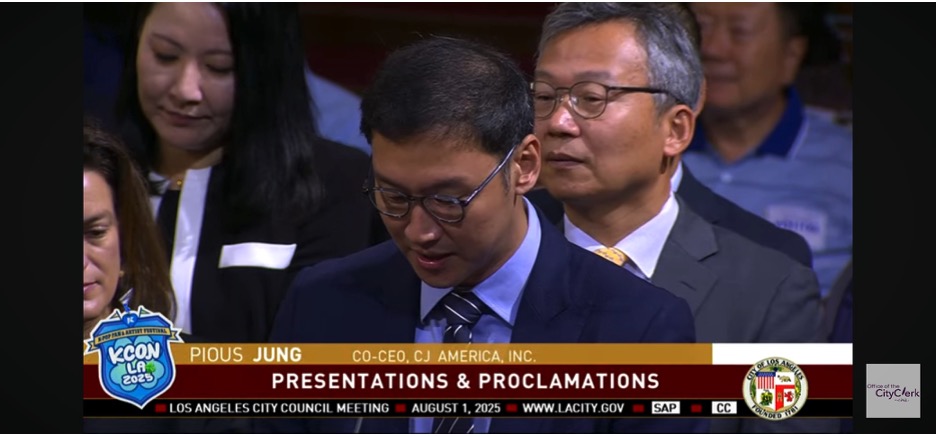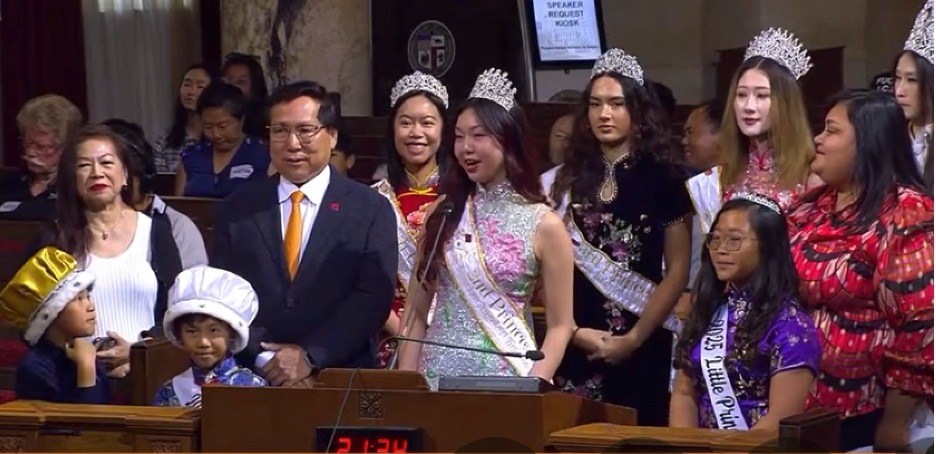Comments
ERIC PREVEN'S NOTEBOOK - Friday’s council meeting was a tale of two cities—a celebration of civic excellence, and a cautionary tale about censorship.
First, we saw a radiant presentation from Korean American Civic Empowerment—young people registering voters, promoting justice, and speaking three languages better than most of us manage one. Impressive, inspiring, and traditionally a very civically engaged (wink-wink) group.
Then came the Miss Chinatown 2025 Court, led by several articulate Queens, who spoke with more grace and clarity than most committee chairs. It was a wonderful reminder that leadership doesn’t require a microphone cutoff button—just purpose and poise.
And speaking of poise, let’s talk about the “CJ” commercials we were treated to. A full-production video, broadcast from City Hall. LA City Ethics must have noticed, and clearly do not care. Well...we'll see.

Now, fast forward to public comment.
Katie: My name is Katie, and I have a general public comment. But I will not let you start my time until I have everybody's attention
Jonathan Groat, Deputy City Attorney: So that's not how we do it. You have one minute for general public comment if you'd like you can adjust the microphone if you need to. Feel free so go ahead.
Katie: Do not start my time until I have everybody’s attention—nope, you restart that.
I took off work.
You guys—you guys work for us, and nobody is paying attention.
Hi. (Gesturing to the council) Hi. You work for us, and we have a comment.
We need you to listen.
I understand that this is typically, like, your job is Parks and Rec. That is not what this is right now.
We are in a state of emergency.
The actual mayor declared that.
And we are here asking you to pay attention.
You have had a summer break.
You know who’s not had a summer break?
Don’t roll your fucking eyes at me. I see you.” (**F word**)
“You know who’s not had a summer break?
The protesters. The citizens of L.A. who are terrified.
You’re not talking about this—and in two weeks, school is back in session.
Fifty percent of the students in L.A. do not feel safe going to school.
Why aren’t you talking about that?
Why is no one having a town hall?
In Seattle, their police chief instructed their police to protect the citizens.
Why can’t you?
Why can’t the LAPD be on our side?
We want LAPD on our side.”
Jonathan Groat, Deputy City Attorney: “Speaker, your time has expired. We need to move on to the next speaker.”
Marqueece Harris-Dawson: Speaker, we need to move on to—
Jonathan Groat, Deputy City Attorney: Your time is expired. Please make way for the next speaker.”
Marqueece Harris-Dawson: “Now.”

The Queens of Chinatown, a twenty-minute presentation.
City Attorney: (formal warning): You are now disrupting the meeting because we cannot continue with public comment. So, speaker—this is your first and only warning. Please—there are other people here to speak. If you’d like to submit additional written comments, you can do so online at LACouncilComment.com.
So again—
And I’d also like to take this opportunity to warn the gentleman in red who is yelling out when I was trying to issue instructions.
So sir, please do not disrupt this meeting.
This is your first and only formal warning.
If you do so again, you may be subject to removal and exclusion.”
And then, a familiar speaker—Herman Herman—takes the podium. And before he can finish an offensive sentence, Council President Marqueece Harris-Dawson interjects:
“You used the N-word. You’re done.”
And just like that—mic cut, speaker removed, free speech flushed down the legislative toilet.
And if this turns into a lawsuit—and let’s face it, Herman’s probably already considering a §1983 complaint—I respectfully request that Mr. Harris-Dawson pay the city's cost out of pocket. Because this was not an act of governance—it was an act of ego. You can’t silence speakers you dislike and send the bill to the city.
So yes, we celebrated the future with Miss Chinatown and KACE. But we also watched our leaders fear a microphone more than corruption.
Free speech isn’t a gift from council presidents. It’s a right. Try honoring it the way those young women did—with grace and courage.
Smart Speaker: Groat, please sit down.
Coming Tuesday @ City Hall
10:00 a.m.
Public comment is open on Items 1 through 13. That’s the usual haul of lighting districts, a pair of street vacations in Reseda and the Pacific View hills, and yes, Bristol Farms is back with another alcohol license request—because a $28 pinot noir in a valet-only parking lot qualifies as "community service."
The marquee fight might be over Item 13, a sweeping ordinance to raise cannabis fines and fees. With dispensaries already limping through bureaucracy, this move has equity applicants sounding alarms. The Department of Cannabis Regulation says it needs the cash to stay afloat—$2.4 million’s worth—but critics will likely question whether this is “revenue neutrality” or another blow to small businesses already on life support.
Item 17 is another dose of density, courtesy of the TFAR (Transfer of Floor Area Rights) program. A developer wants to build a 51-story luxury tower in South Park, bumping the FAR from 6:1 to 9.13:1 with a tidy $11.4 million payment to the city. Only half goes toward affordable housing. The rest, presumably, funds the “elegance.”
Over at Item 15, the Convention Center expansion lumbers forward—another Olympic facelift with a multibillion-dollar bill and minimal public buy-in. Pico Union already voted no. Curren Price may return to champion it. One percent for the arts might fund a plaza beautification, but don’t expect housing, unless it’s decorative.
Cannabis lounges and temporary events arrive at Item 18, as the city scrambles to align with AB 1775. Picture Coachella with city permits. Hernandez and Padilla are eyeing equity licensing tweaks. Expect applause, and pushback from the moral panic crowd.
A quieter storm brews in Item 14, where the Council wants billing records and contract details from Hagerty, AECOM, and IEM—firms hired under emergency authority post-wildfire. With millions already spent, the public wants more than a snazzy slideshow and vague deliverables. Translation: show us the receipts. Julia Wick may or may not remember AECOM funded Garcetti's inauguration (and is deeply embedded in LA County)... she's busy!
Behind the curtain, Closed Session includes nine settlements (Items 30–38). These range from LAPD incidents to a FEHA claim involving the LAFD (Item 34). Expect several million in total payouts, mostly obscured unless someone demands “forthwith” transparency. Item 39 flags potential infrastructure damage at the Hyperion Water Reclamation Plant. Equipment rentals and public plumbing don’t always mix.
There’s a shot that Items 13, 15, or 17 get called special—watch Yaroslavsky, Soto-Martínez, Hernandez, and Blumenfield. The latter may have thoughts on debt, density, or both. FEMA, fo sho.
As always, transparency is not achieved with a lighting district protest hearing tucked behind a workday wall of paperwork and ripped-up sidewalks.
Coming Tuesday @ County Hall
August 5, 2025 – Cool Promises, Hot Rooms
I will try to speak on Item 9, Item 35, and also the CEO’s Employee Count Report that conveniently dropped just before this Board takes its legislative hibernation.
See the linked report.
Let me begin by welcoming back an old friend: Charles Safer.
Apparently, it wasn’t enough for Mr. Safer to ride out his decades-long tenure as Metro’s legal airbag during the agency’s most combustible scandals. He’s now back for a 120-day encore—waiving the legally mandated 180-day PEPRA cooling-off period, with the help of County Counsel Dawyn “We Need Him” Harrison.
Why? Because of the Olympics, of course.
Because of construction claims and Federal Transit Administration shenanigans.
Because someone needs to keep all those cozy Metro legal secrets locked in the drawer.
So we’re bringing Safer back at $163.13 an hour, up to 960 hours, and fully reimbursed by Metro.
Translation: your fare hike just paid for the guy who helped make Metro allergic to subpoenas.
Safer pulled a full Krekorian—retired in March, “urgently needed” by August.
And while we’re on the topic of disappearing acts:
This Board is about to vanish for 21 consecutive days—from August 13 to September 1—leaving behind a mountain of unresolved crises and a September 2 comeback scheduled at 11:00 a.m., not the legally required 1:00 p.m. under the County Charter.
That’s right. If it walks like a special meeting and suppresses like a special meeting… it is a special meeting.
A not-so-special trick to avoid public heat after three weeks of heatwave and no rent relief.
Meanwhile, the County’s workforce is growing—but not on the County’s dime.
Per CEO Fesia Davenport’s latest Employee Count Report, we’ve added 518 employees since January.
Not because the County hired them. Because Sacramento, D.C., and other external partners did.
Here’s the breakdown:
County-funded positions dropped by 285
Externally funded positions increased by 803
This isn’t shrinking government—it’s outsourcing responsibility.
So when your 911 call reroutes to voice mail or your sidewalk is still impacted and broken dreams—just know: it’s not the County’s budget line anymore. It’s someone else’s.
Oh—and Item 14/32? That bold new ordinance to cap rental temperatures at 82°F?
It’s being pushed out until 2027.
Two more summers of heatstroke for tenants who can’t afford an HVAC whisperer.
But don’t worry: there’s a motion to support Breastfeeding (and all the other terms) Month and a feel-good letter for Planned Parenthood.
“Three weeks off, and the first thing this Board does is sneak back in early to avoid the public. That’s not ethics. That’s strategy.”
And speaking of strategy—Item 28?
Classic Parking Inc. v. County of LA — a cool $875,000 to settle a breach of contract.
No discussion, no explanation, no apology.
Classic! I have a story on this...
(Eric Preven is a Studio City-based television writer-producer, award-winning journalist, and longtime community activist. He is known for his sharp commentary on transparency and accountability in local government. Eric successfully brought and won two landmark open government cases in California, reinforcing the public’s right to know. A regular contributor to CityWatch, he combines investigative insight with grassroots advocacy to shine a light on civic issues across Los Angeles.)












